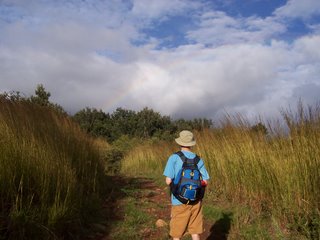 Although most high school graduates successfully answer test questions on photosynthesis- most people don't really understand where the mass of trees/plants comes from.... a group of high school students as well as a group of recent Harvard graduates were asked at their respective commencement ceremonies- where does the mass of a tree come from?
Although most high school graduates successfully answer test questions on photosynthesis- most people don't really understand where the mass of trees/plants comes from.... a group of high school students as well as a group of recent Harvard graduates were asked at their respective commencement ceremonies- where does the mass of a tree come from?Most people answered- 'from nutrients in the soil' 'from the sun' 'from photosynthesis'...when they had to explain photosynthesis- the end product, the bulk of plant mass was never identified.
Not one person interviewed understood that the carbon dioxide (gas) in our atmosphere was converted into solid carbon. Yes gas has mass. Earth's plants are carbon.
It made me very frustrated, but shed some light on why so many people don't understand global warming. The most tangible aspect of the carbon cycle (trees, plants etc.) is only a quickly learned recitation... and yet most of us burn carbon daily... and lots of it....
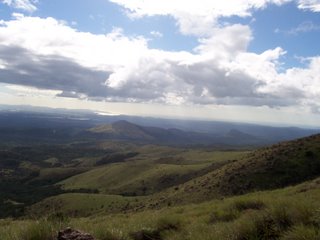 Plants (Carbon) die and are buried for millions of years and metamorphose into fossil fuel---Those fuels remained buried in the earth... sequestered..Now we burn them in our industries, I burn carbon driving my Prism, watching t.v., writing this blog.
Plants (Carbon) die and are buried for millions of years and metamorphose into fossil fuel---Those fuels remained buried in the earth... sequestered..Now we burn them in our industries, I burn carbon driving my Prism, watching t.v., writing this blog.Carbon that was once stored is now burned and released in our atmosphere (as carbon dioxide) the actual quantity of carbon dioxide in our thin atmosphere is increasing... (we can tell that conclusively by looking at atmospheric bubbles that are trapped in ice cores that go back 650,000 years (EPICA). In the last 650,000 years we have never had an atmosphere with as much carbon dioxide in it as we do now. Not during any other warm period (interglacial).
The concentration of carbon dioxide in the atmosphere relates to the temperature on earth... we need some carbon dioxide in the atmosphere to keep us warm and to feed the hungry plants and trees... but the extra carbon dioxide trapped in our atmosphere is heating us up.
Things are getting warmer now...not all days, not all places, but globally. Greenland's majestic glaciers. Huge walls of daunting ice thinning into puddles. If the whole thing goes, which is predicted for my lifetime that means 7 meters of sea level rise.... 15-20 feet...(Washington D.C. and much of Florida will be underwater) this will displace many populations especially in Asia
...many of the mountain glaciers I visited early in my lifetime will be gone by the end of it. Gone is the awing Illecillewaet that I viewed from a quiet perch at 19.
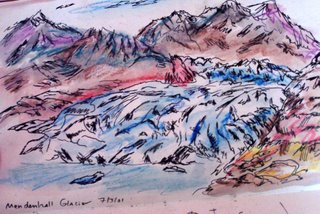 The Eliot Glacier, a popular ski spot, a name on the map, the majestic Mendenhall a bowl in the valley. It is very sad to me at a gut level--- a loss of what is beautiful. But there are more serious consequences ... even dire... think of the people in the Himalayas reliant on glacial melt for water...extreme thirst, parched throats.
The Eliot Glacier, a popular ski spot, a name on the map, the majestic Mendenhall a bowl in the valley. It is very sad to me at a gut level--- a loss of what is beautiful. But there are more serious consequences ... even dire... think of the people in the Himalayas reliant on glacial melt for water...extreme thirst, parched throats.Or worse yet,- will West Antarctica (or more) melt?
Keep burning fossil fuels. Make some money now-
Don't think too hard about your beach house on the coast, you're rich you can always rebuild when the coast moves inland 100-1000 feet. And yet, business as usual is considered the easiest choice. Since the industrial revolution we have burned fossil fuel... raking in the dough. Economics will still exist if we move to other fuels....California has a huge economy and is by far more green than any other state.
And, yes I drive... feeling a bit ill thinking about it....but I can't say that I want the solution to take away the liberty we have in our economy...
I am writing letters in favor of a light rail system, buying local produce (less transport required for food--- no more kiwi fruit, and vow to only invest in companies with sustainable practices... and those at the forefront of energy efficient technology- nanotechnology looks especially profitable-)
We have added insulation to our house, installed low energy flourescent light bulbs, and have committed to making our future home 100% off the grid (we will have solar, and geothermal energy).
As a person who is educated in the consequences of increasing atmospheric carbon dioxide it is my duty to make decisions that reflect this. It is my hope that the public will join the scientific community to demand more efficient energy use and the weaning from fossil fuels.
Floods are instantaneous, but we do not instinctively connect them to climate change. The gradual raise of sea level, the change of climate (shifting agriculture, land practice) these happen too slowly for us to register, to connect with our current energy practices. I hope people are starting to feel the water on their toes like me. Because the water will be over our children's heads. If we had to drop them into the bottom of the pool now- would that make our energy choices easier?
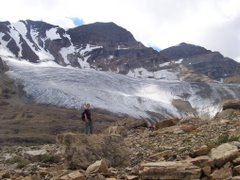
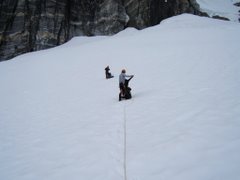

1 comment:
You just explained this in a manner that I can and do understand. Yet not one news source has explained this as simply. Why are we not getting this???
Good luck on informing the rest of us.
Post a Comment